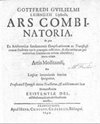Ars Combinatoria (AC), 0381-7032 (print), 2817-5204 (online), is a prestigious research journal in combinatorics, published by the Charles Babbage Research Centre in Winnipeg, Manitoba, Canada. Established in 1976, the journal has been dedicated to advancing the field of combinatorial mathematics through the publication of high-quality research papers. Initially, it published two volumes per year, which subsequently increased to as many as six volumes per year.
Ars Combinatoria (AC) has gained recognition and visibility in the academic community and is indexed in renowned databases such as MathSciNet, Zentralblatt, and SCImago Journal Rank. These indexing services reflect the journal’s quality and importance within the field of combinatorics.
However, it is important to note that as of December 15, 2021, the editorial board of Ars Combinatoria (AC) resigned, resulting in the suspension of journal publication in 2021, and 2022. During its active years, the journal exclusively offered a print version and operated on a subscription-based model. Nevertheless, in response to the changing landscape of academic publishing, Ars Combinatoria (AC) is making a significant transition starting from 2023. The journal will be relaunched in both print and online formats, allowing for broader accessibility and reaching a wider audience.
With its rich history of publishing 155 volumes exclusively in print, Ars Combinatoria (AC) has established itself as a valuable resource in combinatorial mathematics. The forthcoming online edition will further enhance its impact and facilitate the dissemination of cutting-edge research in the field.
Ars Combinatoria (AC) publishes papers in all areas of combinatorial mathematics, with a focus on the following topics:
1. Graph Theory: Study of graphs and their properties, including connectivity, colorings, matchings, cycles, and algorithms.
2. Design Theory: Investigation of combinatorial designs, such as Latin squares, block designs, and finite projective planes.
3. Extremal Combinatorics: Analysis of extremal problems, investigating the maximum or minimum values of combinatorial parameters.
4. Enumeration: Counting and generating combinatorial objects, including permutations, subsets, partitions, and combinatorial sequences.
5. Algebraic Combinatorics: Intersection of combinatorics and algebra, exploring algebraic structures and their combinatorial properties.
6. Combinatorial Optimization: Optimization problems involving discrete structures and combinatorial algorithms for their solutions.
7. Ramsey Theory: Study of the emergence of order within large combinatorial structures and the presence of combinatorial patterns.
8. Automorphism Groups: Examination of symmetries and automorphisms of combinatorial structures, such as graphs and designs.
9. Coding Theory: Investigation of error-correcting codes, code constructions, and decoding algorithms for efficient data transmission.
10. Finite Geometries: Study of geometrical structures defined over finite fields, including projective planes and affine spaces.
11. Chemical Graph Theory: Application of graph theory to study molecular structures, chemical reactions, and related properties.
12. Number Theory: Topics exploring connections between combinatorics and number theory, including partitions, permutations, and combinatorial number theory.
13. Classical Geometry: Investigations of geometrical objects, such as tilings, tessellations, and polyhedra, with a combinatorial approach.
14. Artificial Intelligence and Machine Learning in Combinatorics: Research that applies AI and machine learning techniques to combinatorial problems, such as pattern recognition, network analysis, and combinatorial optimization.
These topics reflect the broad range of research areas covered by Ars Combinatoria, encompassing traditional combinatorial mathematics as well as emerging interdisciplinary applications, ensuring the journal remains a platform for cutting-edge advancements in combinatorics and its integration with AI and machine learning.
《ARS COMBINATORIA》期刊已被查看: 次
此期刊未被最新的JCR期刊引证报告收录








